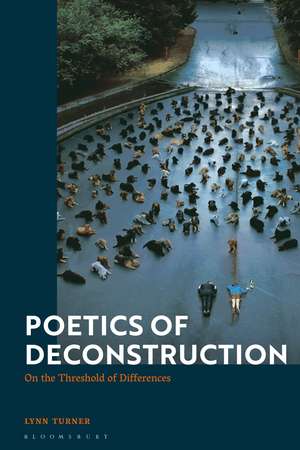Poetics of Deconstruction: On the threshold of differences
Autor Lynn Turneren Limba Engleză Hardback – 14 oct 2020
| Toate formatele și edițiile | Preț | Express |
|---|---|---|
| Paperback (1) | 197.34 lei 6-8 săpt. | |
| Bloomsbury Publishing – 20 apr 2022 | 197.34 lei 6-8 săpt. | |
| Hardback (1) | 597.87 lei 6-8 săpt. | |
| Bloomsbury Publishing – 14 oct 2020 | 597.87 lei 6-8 săpt. |
Preț: 597.87 lei
Preț vechi: 858.24 lei
-30% Nou
Puncte Express: 897
Preț estimativ în valută:
114.40€ • 119.77$ • 94.66£
114.40€ • 119.77$ • 94.66£
Carte tipărită la comandă
Livrare economică 05-19 aprilie
Preluare comenzi: 021 569.72.76
Specificații
ISBN-13: 9781350128590
ISBN-10: 1350128597
Pagini: 224
Ilustrații: 16 bw illus
Dimensiuni: 156 x 234 mm
Greutate: 0.49 kg
Editura: Bloomsbury Publishing
Colecția Bloomsbury Academic
Locul publicării:London, United Kingdom
ISBN-10: 1350128597
Pagini: 224
Ilustrații: 16 bw illus
Dimensiuni: 156 x 234 mm
Greutate: 0.49 kg
Editura: Bloomsbury Publishing
Colecția Bloomsbury Academic
Locul publicării:London, United Kingdom
Caracteristici
Taking seriously the notion that deconstruction takes account of the idiosyncrasies of individual subjects, each chapter examines one or two case studies in detail
Notă biografică
Lynn Turner is Senior Lecturer in Visual Culture, Goldsmiths, University of London, UK. She is the co-editor of The Edinburgh Companion to Animal Studies (2017); co-author of Visual Cultures As. Recollection (2013); editor of The Animal Question in Deconstruction (2013) and an assistant editor of Derrida Today.
Cuprins
Chapter 1: In the Beginnings: Introducing Poetics of Deconstruction Chapter 2: The Animal Cure: inhaling the other in Dean Spanley Chapter 3: Raising Animals: between the basement and the kennel in The Woman Chapter 4: Speculations: gesture in Conceiving Ada and Absent Presence Chapter 5: Outlaws: towards a posthumanist feminine in Dancer in the Dark Chapter 6: 'Unfamiliar Unconscious': the performativity of Infinity Kisses Chapter 7: In Lieu of Conclusion: White God
Recenzii
Lynn Turner's exhilarating, elegant, and very important book overturns common conceptions about human exceptionalism, hospitality, the place accorded to the feminine, and animal intimacy. Turner shows how, at its 'heart', deconstruction entreats us to listen for the poetic rhythms that link the fundamental questions of life to the stereographic rhythms that speak to us from the heart of the other.
Lynn Turner brilliantly follows the trace of differences-animal, sexual, racial-in readings of film, text and flesh that prove the ongoing relevance and importance of deconstruction for our times. Her own poetics offers keen insights into the writings of Derrida, Freud, Cixous, Irigaray, and Haraway among others.
Immersive, subtle, illuminating, bizarre: these are a few of the adjectives that might be used to describe Lynn Turner's compelling book. Poetics of Deconstruction focuses mostly on film and visual culture, but its concerns are multifarious and often surprising - from Irigaray to Björk, from Haraway to von Trier, from cats and dogs to kisses and the death penalty. It is also an especially distinctive and welcome study for the ways in which it brings together Jacques Derrida's writings on the performative with notions of performativity in gender and film theory.
Lynn Turner brilliantly follows the trace of differences-animal, sexual, racial-in readings of film, text and flesh that prove the ongoing relevance and importance of deconstruction for our times. Her own poetics offers keen insights into the writings of Derrida, Freud, Cixous, Irigaray, and Haraway among others.
Immersive, subtle, illuminating, bizarre: these are a few of the adjectives that might be used to describe Lynn Turner's compelling book. Poetics of Deconstruction focuses mostly on film and visual culture, but its concerns are multifarious and often surprising - from Irigaray to Björk, from Haraway to von Trier, from cats and dogs to kisses and the death penalty. It is also an especially distinctive and welcome study for the ways in which it brings together Jacques Derrida's writings on the performative with notions of performativity in gender and film theory.
